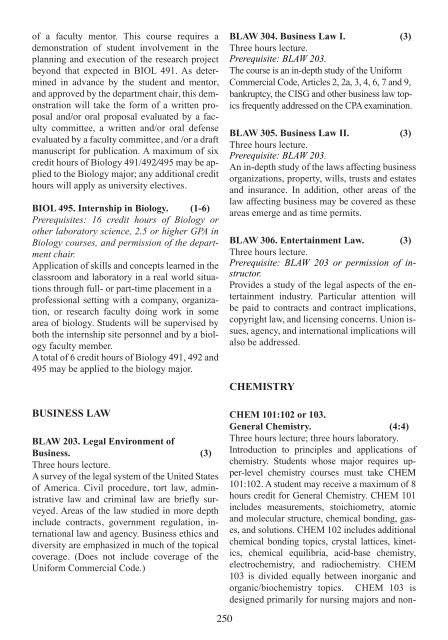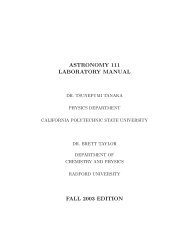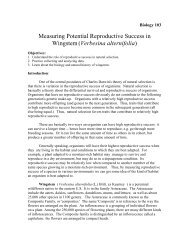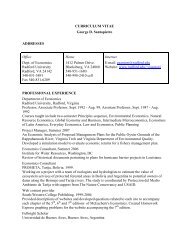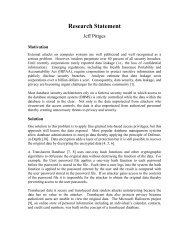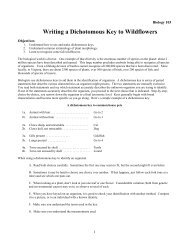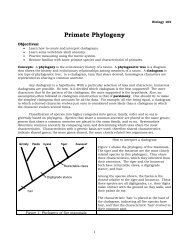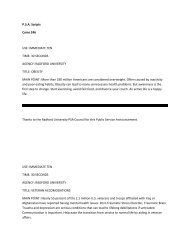Radford University Undergraduate Catalog, 2011-2012
Radford University Undergraduate Catalog, 2011-2012
Radford University Undergraduate Catalog, 2011-2012
You also want an ePaper? Increase the reach of your titles
YUMPU automatically turns print PDFs into web optimized ePapers that Google loves.
of a faculty mentor. This course requires a<br />
demonstration of student involvement in the<br />
planning and execution of the research project<br />
beyond that expected in BIOL 491. As determined<br />
in advance by the student and mentor,<br />
and approved by the department chair, this demonstration<br />
will take the form of a written proposal<br />
and/or oral proposal evaluated by a faculty<br />
committee, a written and/or oral defense<br />
evaluated by a faculty committee, and /or a draft<br />
manuscript for publication. A maximum of six<br />
credit hours of Biology 491/492/495 may be applied<br />
to the Biology major; any additional credit<br />
hours will apply as university electives.<br />
BIOL 495. Internship in Biology. (1-6)<br />
Prerequisites: 16 credit hours of Biology or<br />
other laboratory science, 2.5 or higher GPA in<br />
Biology courses, and permission of the department<br />
chair.<br />
Application of skills and concepts learned in the<br />
classroom and laboratory in a real world situations<br />
through full- or part-time placement in a<br />
professional setting with a company, organization,<br />
or research faculty doing work in some<br />
area of biology. Students will be supervised by<br />
both the internship site personnel and by a biology<br />
faculty member.<br />
A total of 6 credit hours of Biology 491, 492 and<br />
495 may be applied to the biology major.<br />
BLAW 304. Business Law I. (3)<br />
Three hours lecture.<br />
Prerequisite: BLAW 203.<br />
The course is an in-depth study of the Uniform<br />
Commercial Code, Articles 2, 2a, 3, 4, 6, 7 and 9,<br />
bankruptcy, the CISG and other business law topics<br />
frequently addressed on the CPA examination.<br />
BLAW 305. Business Law II. (3)<br />
Three hours lecture.<br />
Prerequisite: BLAW 203.<br />
An in-depth study of the laws affecting business<br />
organizations, property, wills, trusts and estates<br />
and insurance. In addition, other areas of the<br />
law affecting business may be covered as these<br />
areas emerge and as time permits.<br />
BLAW 306. Entertainment Law. (3)<br />
Three hours lecture.<br />
Prerequisite: BLAW 203 or permission of instructor.<br />
Provides a study of the legal aspects of the entertainment<br />
industry. Particular attention will<br />
be paid to contracts and contract implications,<br />
copyright law, and licensing concerns. Union issues,<br />
agency, and international implications will<br />
also be addressed.<br />
CHEMISTRY<br />
BUSINESS LAW<br />
BLAW 203. Legal Environment of<br />
Business. (3)<br />
Three hours lecture.<br />
A survey of the legal system of the United States<br />
of America. Civil procedure, tort law, administrative<br />
law and criminal law are briefly surveyed.<br />
Areas of the law studied in more depth<br />
include contracts, government regulation, international<br />
law and agency. Business ethics and<br />
diversity are emphasized in much of the topical<br />
coverage. (Does not include coverage of the<br />
Uniform Commercial Code.)<br />
250<br />
CHEM 101:102 or 103.<br />
General Chemistry. (4:4)<br />
Three hours lecture; three hours laboratory.<br />
Introduction to principles and applications of<br />
chemistry. Students whose major requires upper-level<br />
chemistry courses must take CHEM<br />
101:102. A student may receive a maximum of 8<br />
hours credit for General Chemistry. CHEM 101<br />
includes measurements, stoichiometry, atomic<br />
and molecular structure, chemical bonding, gases,<br />
and solutions. CHEM 102 includes additional<br />
chemical bonding topics, crystal lattices, kinetics,<br />
chemical equilibria, acid-base chemistry,<br />
electrochemistry, and radiochemistry. CHEM<br />
103 is divided equally between inorganic and<br />
organic/biochemistry topics. CHEM 103 is<br />
designed primarily for nursing majors and non-


